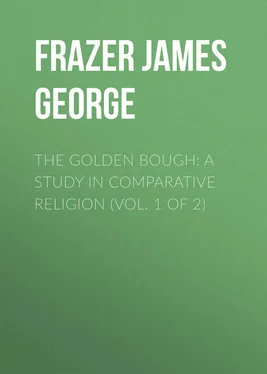Reinsberg-Düringsfeld, Fest-Kalendar aus Böhmen , p. 217; Mannhardt, B. K. p. 566.
Birlinger, Volksthümliches aus Schwaben , ii. 74 sq. ; Mannhardt, B. K. p. 566.
Aristophanes, Plutus , 1054; Mannhardt, A. W. F. p. 222 sq.
Reinsberg-Düringsfeld, Fest-Kalendar aus Böhmen , p. 86 sqq. ; Mannhardt, B. K. p. 156.
Chambers, Book of Days , i. 573.
Mannhardt, B. K. p. 312.
Mannhardt, B. K. p. 313.
Ib. p. 314.
Bavaria, Landes-und Volkskunde des Königreichs Bayern , iii. 357; Mannhardt, B. K. p. 312 sq.
Mannhardt, B. K. p. 313 sq.
Dalton, Ethnology of Bengal , p. 261.
Mannhardt, B. K. p. 315 sq.
Ralston, Songs of the Russian People , p. 234.
Mannhardt, B. K. p. 318.
Mannhardt, B. K. p. 318; Grimm, Deutsche Mythologie , 4ii. 657.
Mannhardt, B. K. p. 320; Witzschel, Sagen, Sitten und Gebräuche aus Thüringen , p. 211.
Mannhardt, B. K. p. 322; Hone, Every-day Book , i. 583 sqq. ; Dyer, British Popular Customs , p. 230 sq.
Mannhardt, B. K. p. 323.
Ib.
Birlinger, Volksthümliches aus Schwaben , ii. 114 sq. ; Mannhardt, B. K. p. 325.
Mannhardt, B. K. p. 341 sq.
Kuhn und Schwartz, Norddeutsche Sagen, Märchen und Gebräuche , p. 380.
Kuhn und Schwartz, op. cit. p. 384; Mannhardt, B. K. p. 342.
Reinsberg-Düringsfeld, Fest-Kalendar aus Böhmen , p. 260 sq. ; Mannhardt, B. K. p. 342 sq.
Mannhardt, B. K. p. 347 sq. ; Witzschel, Sagen, Sitten und Gebräuche aus Thüringen , p. 203.
Reinsberg-Düringsfeld, Fest-Kalendar aus Böhmen , p. 253 sqq.
Reinsberg-Düringsfeld, Fest-Kalendar aus Böhmen , p. 262; Mannhardt, B. K. p. 353 sq.
B. K. p. 355.
Above, p. 18.
Reinsberg-Düringsfeld, Fest-Kalendar aus Böhmen , p. 93; Mannhardt, B. K. p. 344.
Mannhardt, B. K. p. 343 sq.
Dyer, British Popular Customs , p. 270 sq.
Mannhardt, B. K. p. 344 sq. ; Cortet, Fêtes religieuses , p. 160 sqq. ; Monnier, Traditions populaires comparées , p. 282 sqq. ; Bérenger-Féraud, Réminiscences populaires de la Provence , p. 1 sqq.
Above, p. 60.
Reinsberg-Düringsfeld, Fest-Kalendar aus Böhmen , p. 265 sq. ; Mannhardt, B. K. p. 422.
Monnier, Traditions populaires comparées , p. 304; Mannhardt, B. K. p. 423.
Brand, Popular Antiquities , i. 233 sq. Bohn's ed.; Mannhardt, B. K. p. 424.
E. Sommer, Sagen, Märchen und Gebräuche aus Sachsen und Thüringen , p. 151 sq. ; Mannhardt, B. K. p. 431 sq.
This custom was told to Mannhardt by a French prisoner in the war of 1870-71, B. K. p. 434.
Mannhardt, B. K. p. 434 sq.
Ib. p. 435.
Martin, “Description of the Western Islands of Scotland,” in Pinkerton's Voyages and Travels , iii. 613; Mannhardt, B. K. p. 436.
Scotland and Scotsmen in the Eighteenth Century , from the MSS. of John Ramsay of Ochtertyre. Edited by Alex. Allardyce (Edinburgh, 1888), ii. 447.
Kuhn, Märkische Sagen und Märchen , p. 318 sqq. ; Mannhardt, B. K. p. 437.
Mannhardt, B. K. p. 438.
Monnier, Traditions populaires comparées , p. 283 sq. ; Cortet, Fêtes religieuses , p. 162 sq. ; Mannhardt, B. K. p. 439 sq.
Above, pp. 69 sqq. , 85.
See especially his Antike Wald- und Feldkulte .
Pausanias, ix. 3; Plutarch, ap. Eusebius, Praepar. Evang. iii. 1 sq.
Above, p. 76 sq.
Above, p. 79.
B. K. p. 177.
B. K. p. 177 sq.
Brand, Popular Antiquities , i. 318, Bohn's ed.; B. K. p. 178.
Hone, Every-day Book , ii. 595 sq. ; B. K. p. 178.
Pausanias, viii. 42.
Once upon a time the Wotjaks of Russia, being distressed by a series of bad harvests, ascribed the calamity to the wrath of one of their gods, Keremet , at being unmarried. So they went in procession to the sacred grove, riding on gaily-decked waggons, as they do when they are fetching home a bride. At the sacred grove they feasted all night, and next morning they cut in the grove a square piece of turf which they took home with them. “What they meant by this marriage ceremony,” says the writer who reports it, “it is not easy to imagine. Perhaps, as Bechterew thinks, they meant to marry Keremet to the kindly and fruitful mukyl'c in , the earth-wife, in order that she might influence him for good.” – Max Buch, Die Wotjäken, eine ethnologische Studie (Stuttgart, 1882), p. 137.
At Cnossus in Crete, Diodorus, v. 72; at Samos, Lactantius, Instit. i. 17; at Athens, Photius, sv. ἱερὸν γάμον; Etymolog. Magn. sv. ἱερομνήμονες, p. 468. 52.
Iliad , xiv. 347 sqq.
Demosthenes, Neaer. § 73 sqq. p. 1369 sq. ; Hesychius, svv. Διονύσου γάμος and γεραραί; Etymol. Magn. sv. γεραῖραι; Pollux, viii. 108; Aug. Mommsen, Heortologie , p. 357 sqq. ; Hermann, Gottesdienstliche Alterthümer , 2§ 32. 15, § 58. 11 sqq.
Читать дальше












